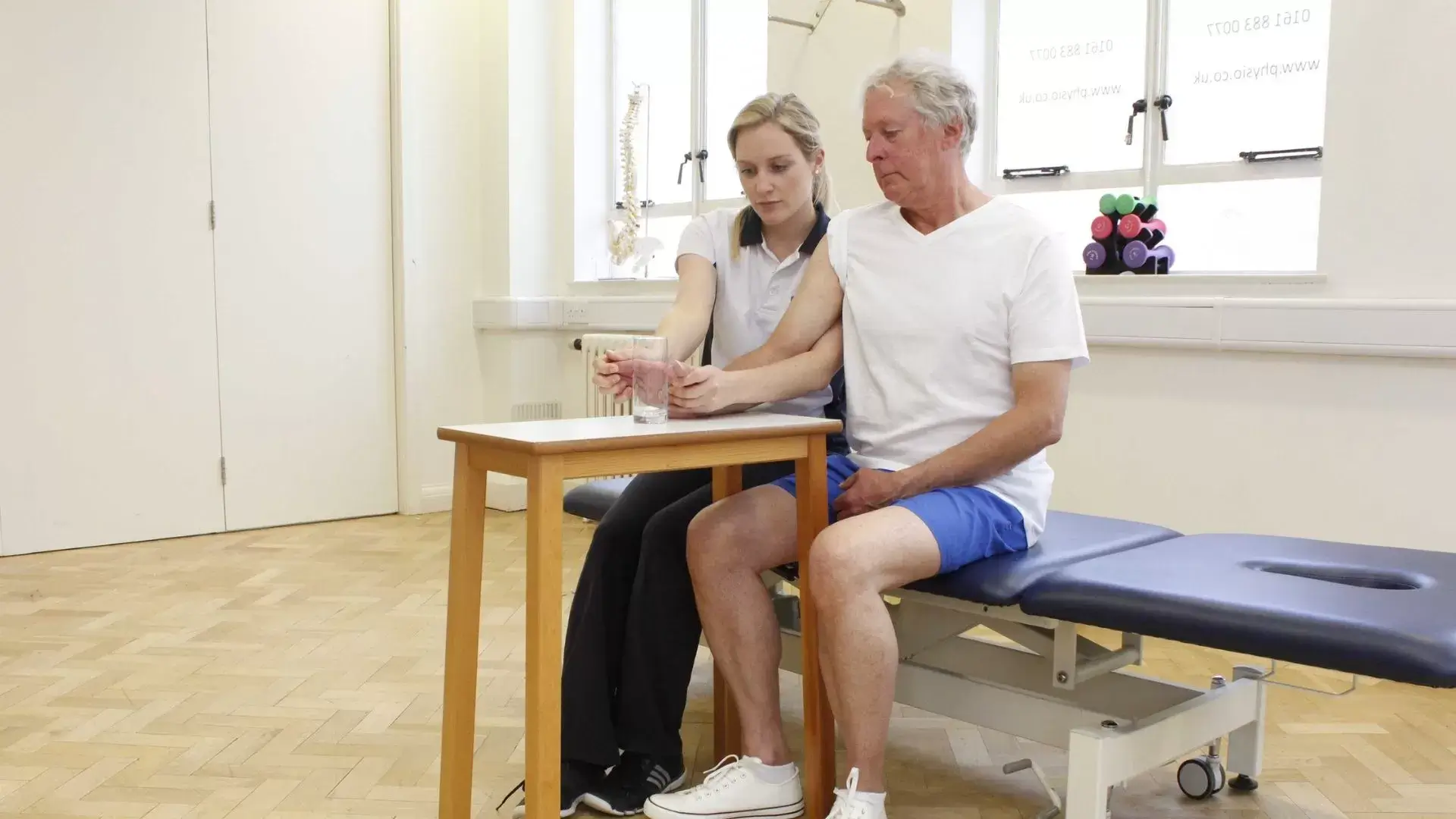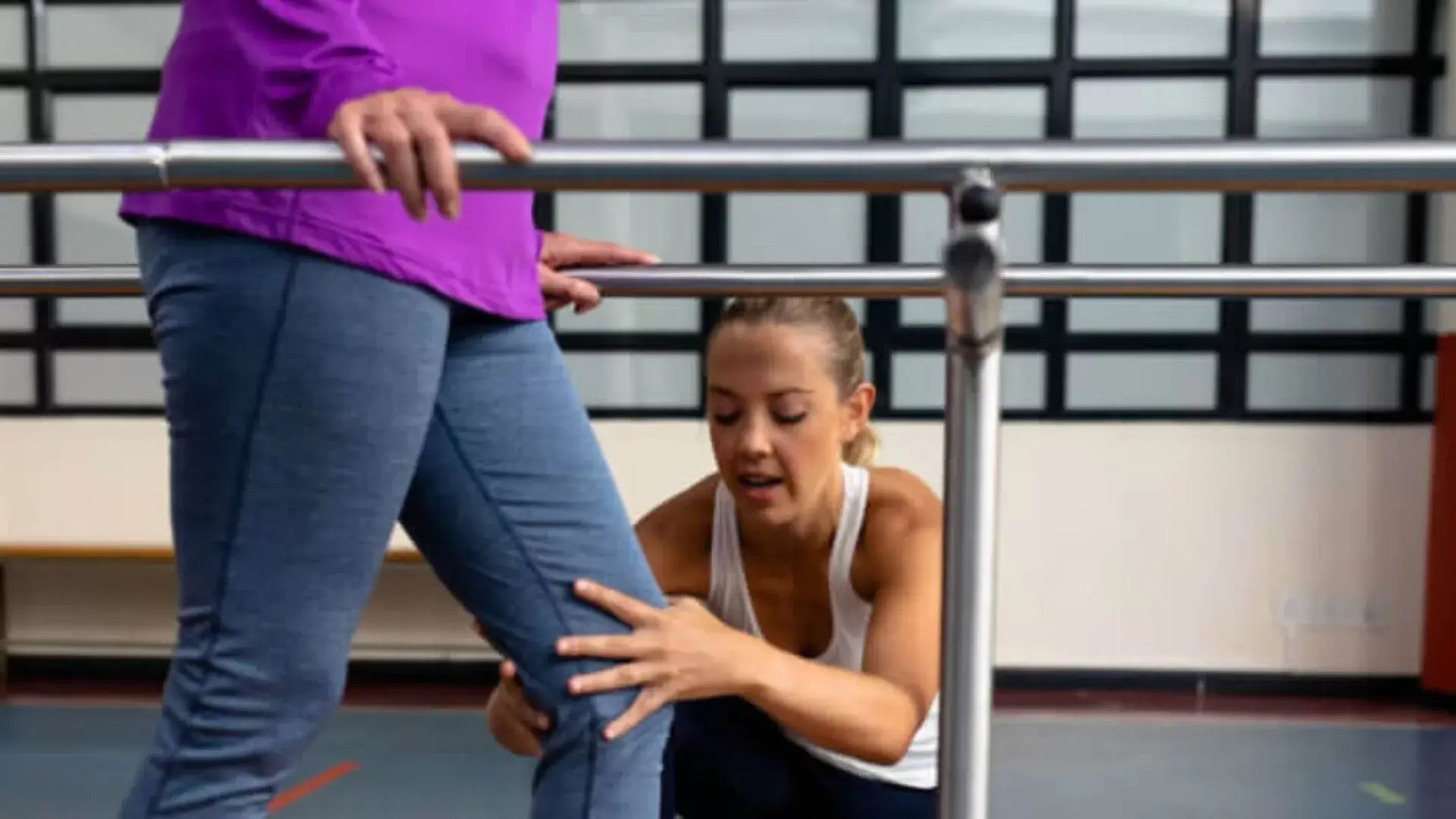We acknowledge the challenges multiple sclerosis presents, especially regarding mobility and daily activities. In Mississauga, we offer specialized physiotherapy for multiple sclerosis services tailored to your needs. Our approach emphasizes neurorehabilitation techniques that enhance strength, balance, and overall well-being. We create personalized exercise programs to address specific symptoms like fatigue, spasticity, and balance issues. Our compassionate physiotherapy team works closely with you to improve your independence and quality of life. Together, we can explore effective strategies for managing your MS symptoms. There’s so much more available to support you on this journey.

At Mississauga Physio Chiro Clinic, we specialize in providing tailored physiotherapy and chiropractic services designed to support individuals with multiple sclerosis in managing their symptoms and enhancing their quality of life. Our dedicated team understands the unique challenges faced by those living with MS and is committed to delivering personalized care that addresses individual needs.
Through our extensive physical therapy programs, we focus on neurorehabilitation techniques that aim to improve strength, balance, and coordination. We incorporate evidence-based exercise for MS, which is vital for maintaining mobility and overall well-being. Our Expert Therapists in Mississauga work closely with clients to design customized exercise regimens that can be easily integrated into daily routines.
In addition, we offer guidance on the appropriate use of mobility aids, ensuring that our clients can navigate their environments safely and confidently. Our chiropractic services complement physiotherapy by addressing musculoskeletal issues that may arise due to MS. Together, these services create a holistic approach to managing symptoms and fostering independence. We believe that with the right support, individuals with multiple sclerosis can lead fulfilling lives, and we’re here to help every step of the way.
Multiple sclerosis can greatly impact mobility and daily function, often leading to challenges in movement, coordination, and overall independence. As we navigate life with multiple sclerosis, we may experience various symptoms stemming from neurological dysfunction. These can include muscle weakness, which affects our ability to perform everyday tasks, from climbing stairs to carrying groceries.
Balance issues frequently arise, making us feel unsteady and increasing the risk of falls. This can lead to a reluctance to engage in activities we once enjoyed, further impacting our quality of life. We might find ourselves adapting our routines, relying on assistive devices, or avoiding certain situations altogether to manage our mobility challenges.
Understanding how multiple sclerosis affects our bodies helps us to address these concerns more effectively. By recognizing the interplay between muscle weakness, balance issues, and daily functioning, we can better advocate for our needs and seek appropriate support. Though the journey may be challenging, it’s vital to remember we’re not alone, and there are resources available to help us maintain our independence and enhance our overall well-being.
Finding effective ways to manage the symptoms of multiple sclerosis is essential for maintaining mobility and independence, and physiotherapy offers valuable strategies tailored to our specific needs. Through targeted interventions, physiotherapy can help address common multiple sclerosis symptoms, such as gait disturbances and coordination problems.
By working with a skilled physiotherapist, we can develop personalized exercise regimens that focus on improving strength, balance, and flexibility. These exercises not only enhance our physical capabilities but also contribute to greater confidence in daily activities. In addition, physiotherapy often includes education about energy conservation techniques and posture, which are vital for preventing fatigue and ensuring safety.
It’s also important to note that physiotherapy can be complemented by occupational therapy. Together, these disciplines offer a holistic approach to managing multiple sclerosis, promoting both physical and functional well-being. They can help us adapt our living environments and daily routines, making it easier to navigate daily tasks and enhance our quality of life. Ultimately, engaging in physiotherapy enables us to take an active role in managing our health and empowers us to live more fulfilling lives despite the challenges of multiple sclerosis.

Maneuvering the key movement challenges associated with multiple sclerosis requires an understanding of the symptoms we may face and the effective solutions available to us. Many of us experience spasticity, which leads to muscle stiffness and can restrict our range of motion. This can be both uncomfortable and limiting. Tremors may also affect our ability to perform daily tasks, making simple actions feel intimidating. Additionally, numbness can impede our sensory feedback, complicating coordination and balance. Fatigue, a pervasive issue, often exacerbates these challenges, leaving us feeling overwhelmed.
To address these symptoms, we can implement targeted strategies. Stretching and strengthening exercises can help alleviate spasticity, while practicing fine motor skills may improve our control over tremors. Incorporating balance training can also enhance our stability, reducing the risk of falls. It’s essential for us to communicate openly with our physiotherapist about our experiences, as personalized therapy can provide tailored solutions that address our unique challenges. By recognizing these movement difficulties and actively engaging in therapeutic practices, we empower ourselves to navigate life with multiple sclerosis more effectively.
Overcoming mobility limitations in MS often feels challenging, but with the right physiotherapy strategies, we can regain confidence and independence in our daily activities. Physiotherapy plays an essential role in helping us navigate these challenges, as it focuses on tailored exercises and techniques that address our unique mobility issues.
We often face chronic pain and fatigue, which can hinder our ability to move freely. A skilled physiotherapist can guide us in managing these symptoms through targeted interventions, allowing us to maintain our mobility. Additionally, incorporating assistive devices, such as walkers or canes, can provide extra support and stability, making it easier for us to engage in daily activities.
Lifestyle modifications are also important for overcoming mobility limitations. By making small changes, such as adjusting our home environment or establishing a consistent exercise routine, we can greatly improve our mobility and overall well-being.
Ultimately, with the help of physiotherapy, we can enhance our quality of life, regain our independence, and tackle the mobility limitations that MS presents. Together, we can embrace these strategies to lead more fulfilling lives.
Building strength and endurance is essential for us as we work to improve our overall function and manage the challenges posed by multiple sclerosis. Through targeted physiotherapy, we can focus on exercises that enhance our muscle strength and cardiovascular endurance, which are critical for daily activities and mobility.
Strength training helps in building muscle mass, reducing fatigue, and enhancing our ability to perform everyday tasks. It also plays a significant role in maintaining joint stability and preventing injuries. Meanwhile, improving our endurance allows us to engage in activities for longer periods without excessive fatigue, which is fundamental for maintaining our quality of life.
As we participate in a structured physiotherapy program, we learn to set realistic goals and gradually increase the intensity of our workouts. This approach not only boosts our physical capabilities but also fosters a sense of accomplishment and motivation. By prioritizing strength and endurance development, we’re taking proactive steps towards achieving improved function in our lives, ultimately empowering us to navigate the challenges of multiple sclerosis with greater confidence and independence.
Effective physiotherapy techniques play an essential role in reducing spasticity and muscle stiffness, helping us regain mobility and enhance our overall comfort. For individuals with multiple sclerosis, these techniques can considerably improve daily functioning and quality of life.
One approach we often utilize is stretching exercises, which help lengthen tight muscles and promote flexibility. This can alleviate discomfort caused by muscle stiffness. Additionally, we incorporate rhythmic and repetitive movements, which can facilitate better muscle control and coordination, further addressing spasticity.
Heat therapy is another effective method, as it relaxes muscles and increases blood flow, providing relief from stiffness. We also explore alternative therapies, such as hydrotherapy, where exercises are performed in warm water, offering buoyancy and reducing strain on the body.
Moreover, we encourage the use of electrical stimulation to target specific muscle groups, assisting in reducing spasticity and improving overall muscle function. By personalizing our physiotherapy techniques, we aim to empower our clients, actively involving them in their rehabilitation journey. Together, we can work towards managing the symptoms of multiple sclerosis more effectively, ultimately promoting a more comfortable and active lifestyle.
Many individuals with multiple sclerosis struggle with balance and coordination, making targeted physiotherapy essential for enhancing these crucial skills. The challenges MS brings, such as neuroinflammation and spinal cord lesions, can greatly impact our ability to maintain stability and perform everyday tasks. Through specialized physiotherapy for MS, we can work together to address these issues and improve our overall quality of life.
In our sessions, we focus on exercises that promote balance and coordination, helping to reduce the feelings of tingling and weakness that often accompany MS. By incorporating techniques like proprioceptive training and dynamic stability exercises, we can enhance our body awareness and control. These targeted interventions not only strengthen our muscles but also help retrain our nervous system to adapt to the changes caused by MS.
As we progress, we’ll continually assess our balance and coordination, adjusting our approach based on our individual needs. This personalized physiotherapy plan empowers us to reclaim our confidence and independence, ultimately leading to better mobility and reduced risk of falls. Together, we can make strides toward improved balance and coordination, enhancing our daily lives despite the challenges of multiple sclerosis.

As we work on enhancing balance and coordination, it’s equally important to focus on neuromuscular rehabilitation, which plays an essential role in supporting nerve health for those of us living with multiple sclerosis. This approach aims to counteract the effects of nerve degeneration, a common challenge in MS, by strengthening the connections between our muscles and the nervous system.
Neuromuscular rehabilitation encompasses various physiotherapy techniques designed to stimulate and promote the function of oligodendrocytes, the cells responsible for forming the protective myelin sheath around our nerves. By engaging in targeted exercises and interventions, we can help preserve nerve integrity and potentially slow the progression of our symptoms.
Incorporating complementary medicine can further enhance our rehabilitation efforts. Techniques like yoga, acupuncture, or meditation may provide additional support and foster a holistic approach to our health. Together, these strategies not only facilitate physical improvement but also empower us to take an active role in our wellness journey. By embracing neuromuscular rehabilitation, we can cultivate resilience, improve our quality of life, and support our nerve health as we navigate the complexities of multiple sclerosis.
Managing MS-related pain requires a multifaceted physiotherapy approach tailored to our individual needs and experiences. By integrating various therapy techniques, we can effectively address the complexities of pain associated with multiple sclerosis. One of the cornerstone methods in our rehabilitation journey is exercise therapy. Engaging in customized exercise programs not only strengthens our muscles but also improves flexibility and reduces pain.
Additionally, specific manual therapy techniques, such as soft tissue mobilization and joint manipulation, can enhance our range of motion and alleviate discomfort. We often find that incorporating modalities like heat or ice therapy can provide immediate relief, complementing our overall treatment plan.
It’s important for us to communicate openly with our physiotherapist about our pain levels and any barriers we may face in executing our prescribed activities. This collaboration allows for ongoing adjustments to our therapy, ensuring that we’re consistently progressing. Through a holistic and personalized approach to physiotherapy, we can manage MS-related pain more effectively, fostering better quality of life and functional independence. Together, we can navigate the challenges of MS with resilience and support.
Combating fatigue in multiple sclerosis requires us to adopt effective energy-saving strategies and targeted therapies that can considerably enhance our daily functioning and quality of life. Fatigue is one of the most common and challenging symptoms we face, often impacting our ability to engage in daily activities.
To manage this fatigue, we can implement various energy-saving strategies, such as prioritizing tasks, breaking activities into smaller parts, and allowing for regular rest breaks. Physiotherapy plays a vital role in this process, as it helps us develop personalized rehabilitation plans that focus on improving strength and endurance.
Additionally, connecting with MS support groups can provide us with valuable insights and shared experiences that can further aid in managing fatigue. These groups often share practical tips and emotional support, which can alleviate feelings of isolation.
Finding ways to manage fatigue often leads us to explore assistive devices that can markedly enhance our mobility and independence. For those of us living with multiple sclerosis, these devices play a significant role in daily life, providing the support we need to navigate our environments more effectively.
Incorporating assistive devices into our routines can greatly improve our overall quality of life. From canes and walkers to scooters and wheelchairs, these tools are designed to aid our mobility and reduce the physical strain we may experience. By working closely with our physiotherapy team, we can identify which devices best suit our individual needs and circumstances, ensuring that we maintain our independence while staying safe.
Moreover, assistive devices not only help us move around but also empower us to engage more fully in social activities and daily tasks. This sense of independence is essential to our mental and emotional well-being. As we embrace these tools, we take proactive steps toward managing multiple sclerosis, allowing us to reclaim our lives and participate actively in our communities.
Adapting our lifestyle and incorporating home exercises can greatly enhance our management of multiple sclerosis, allowing us to maintain strength and flexibility while reducing fatigue. By making specific lifestyle changes, we can create an environment that supports our physical and emotional well-being.
Integrating home exercises into our daily routine is a crucial aspect of effective MS management. Exercise therapy, guided by our physiotherapist, can be tailored to our individual needs, ensuring we safely engage in activities that promote mobility and strength. Simple exercises, like stretching, balance training, and light resistance work, can be done at home, making it easier for us to stay consistent.
It’s essential to listen to our bodies and adapt our exercises as needed. We can also consider our daily activities; incorporating movement into tasks, such as standing while cooking or taking short walks, can further enhance our overall health. By committing to these lifestyle changes and home exercises, we not only empower ourselves but also foster a greater sense of control over our MS management. Together, we can navigate this journey with resilience and optimism, ensuring a better quality of life.
Supporting cognitive and emotional well-being through physiotherapy can play an essential role in enhancing our overall health and quality of life as we navigate the challenges of multiple sclerosis. Many of us experience cognitive impairment and emotional changes, which can greatly impact our daily lives. Through targeted physiotherapy, we can address these challenges, helping us regain a sense of control and improve our mental resilience.
Recent MS research and clinical trials have shown that physiotherapy isn’t just about physical rehabilitation; it also encompasses exercises and techniques aimed at boosting cognitive function and emotional stability. By incorporating activities that stimulate mental engagement and emotional support, physiotherapy can help us build coping strategies, enhance our mood, and reduce feelings of anxiety or depression.
We’re not alone in this journey, and the collaborative approach of physiotherapy empowers us to take charge of our cognitive and emotional health. By working closely with our physiotherapists, we can tailor our sessions to our specific needs, ultimately leading to a more fulfilling life despite the challenges of MS. Together, we can cultivate a supportive environment that nurtures our well-being.
As we address our cognitive and emotional well-being, it’s equally important to focus on strategies that can help slow disease progression and promote long-term mobility in individuals living with multiple sclerosis. Engaging in regular physiotherapy is a cornerstone of effective rehabilitation, allowing us to maintain strength, flexibility, and overall physical function.
Through tailored exercises and interventions, physiotherapy can help us counteract some of the physical limitations associated with multiple sclerosis. It enables us to build endurance and improve our balance, which are vital for maintaining independence. Furthermore, physiotherapists can educate us on body mechanics and energy conservation techniques, empowering us to manage our symptoms more effectively.
Finding expert physiotherapy support for multiple sclerosis in Mississauga can greatly enhance our rehabilitation journey and improve our quality of life. Many of us living with multiple sclerosis face unique challenges that can be addressed through tailored physiotherapy. The right expert support not only aids in managing symptoms but also empowers us to regain control over our mobility and daily activities.
In Mississauga, we have access to specialized physiotherapists who understand the complexities of multiple sclerosis and are skilled in creating personalized treatment plans. These plans often incorporate exercises that focus on strength, balance, and coordination, which are essential for maintaining function and independence. Additionally, physiotherapy can complement disease-modifying therapies by helping us manage side effects and improve overall well-being.
The compassionate guidance of a physiotherapist familiar with our condition can make a significant difference in our rehabilitation. By working together, we can set achievable goals, track our progress, and adapt our strategies to guarantee we’re making the most of our journey. Let’s take the proactive step of seeking expert physiotherapy support in Mississauga to enhance our health and quality of life. Contact us to schedule a consultation.
Living in Mississauga offers us a vibrant community with a rich cultural diversity and numerous resources that can enhance our experience, especially for those seeking support for conditions like multiple sclerosis. As one of the largest cities in Ontario, Mississauga provides access to a variety of healthcare services tailored to those living with this central nervous system disorder.
We’re fortunate to have numerous physiotherapy clinics that specialize in treating multiple sclerosis. These facilities not only focus on physical rehabilitation but also create an inclusive environment that fosters understanding and compassion. Here, we can connect with healthcare professionals who are knowledgeable about the unique challenges faced by individuals with multiple sclerosis.
Furthermore, Mississauga’s community programs and support groups play an essential role in our journey. They encourage us to engage with others who share similar experiences, helping to reduce feelings of isolation. In this city, we find not just medical support, but also emotional and social resources that can greatly improve our quality of life. Together, we can navigate the complexities of living with multiple sclerosis, knowing we have a supportive community at our side.

When we’re seeking a physiotherapist for MS, we should prioritize their qualifications and experience. It’s important they have specialized training in neurological conditions, particularly MS. We’ll want to look for certifications in rehabilitation techniques and a solid understanding of the disease’s progression. A compassionate approach and strong communication skills are also key, as they guarantee we feel understood and supported throughout our treatment journey. Let’s take the time to find someone who meets these criteria.
When considering how often we should attend physiotherapy sessions for MS, it often depends on our individual needs and goals. Generally, we might start with sessions once or twice a week, adjusting as we progress. Regular attendance can help us manage symptoms effectively, improve mobility, and enhance our overall well-being. It’s essential to communicate with our physiotherapist to find a frequency that works best for us, ensuring we’re making the most of our treatment.
When it comes to exercise, we should be cautious about certain activities if we have MS. High-impact exercises or those that risk falls, like running or heavy weightlifting, might not be suitable for us. It’s essential to avoid any movements that exacerbate fatigue or discomfort. Instead, we can focus on low-impact exercises, such as swimming or gentle stretching, which can be beneficial. Always consulting our healthcare provider is key to tailoring our exercise regimen safely.
Yes, physiotherapy can indeed help with cognitive issues related to MS. We’ve seen that tailored exercises and strategies can enhance cognitive function, improve memory, and boost overall mental clarity. By engaging in specific activities designed to challenge our cognitive skills, we can work towards overcoming some of the cognitive challenges we face. It’s crucial to collaborate with a qualified physiotherapist who understands our needs and can create a personalized plan for us.
To assess the effectiveness of our physiotherapy treatment, we should regularly track our progress through specific goals and outcomes. Keeping a detailed journal of our symptoms, mobility, and energy levels can provide valuable insights. It’s also beneficial to have open conversations with our physiotherapist about our experiences and any changes we notice. Regular assessments and adjustments to our treatment plan can help guarantee we’re on the right path to achieving our desired results.
Reach out to us today to book an appointment or learn more about our services. Our friendly team is here to answer your questions and help you take the first step toward improved health and wellness.
(647) 372-1209

At our “Mississauga Physio Chiro Clinic”, we are dedicated to providing personalized care that addresses the root cause of your discomfort. With a team of experienced physiotherapists and chiropractors, we focus on restoring your mobility, relieving pain, and enhancing your overall well-being.